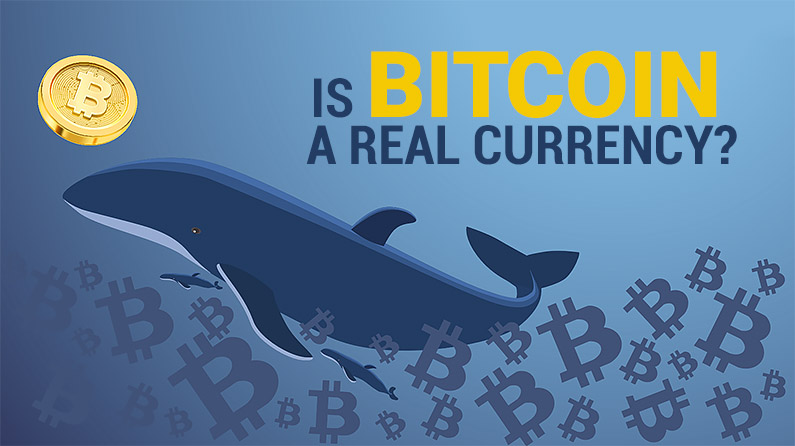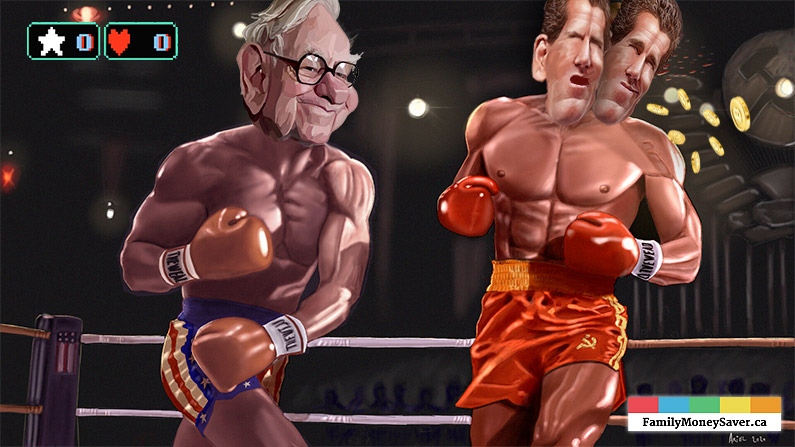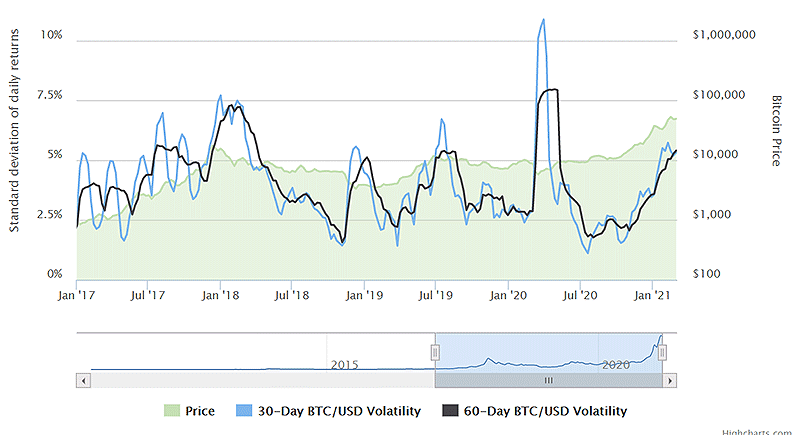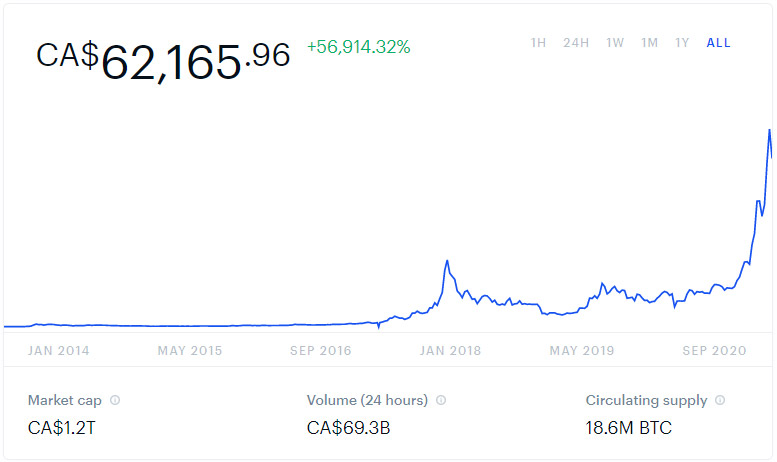Did you know as much as 20% of all Bitcoin are possibly lost forever? They’re as good as gone. To the bottom of the ocean.
Bitcoin is a hot topic these days and was the recent subject matter on an episode of the popular Canadian financial podcast, the FI Garage. I decided I would offer to sponsor the episode but under one condition… that I could pay in Bitcoin.
They agreed.
During the episode “What’s a Bitcoin Anyway?”, the show’s hosts, Money Mechanic, The Accountant and The Economist, give us an excellent general overview on Bitcoin. They also present a fair and balanced opinion of the technology while at the same time debating its usefulness as a:
- Currency
- Store of value
- Investment.
I’ll explain below why it’s none of these and attempt to erode some of your faith in Bitcoin.
Even Warren Buffett has stated that Bitcoin will likely end badly.
An Extremely Brief History
The quick backstory. Bitcoin was created as a concept in late 2008 with an accompanying whitepaper, authored by one Keyser Söze “Satoshi Nakamoto” (a presumed pseudonym or alias for the inventor(s)).
We don’t actually know who created it, which in itself is somewhat bothersome (to me at least) and raises a lot of questions. Regardless, the main idea or concept behind Bitcoin was to develop a means to conduct transactions, peer-to-peer, without relying on third parties such as banks.
The verification process is done independently by Bitcoin miners (a network of computers that essentially holds copies of the official ledger or record of transactions) by utilizing ‘blockchain’ technology and ‘solving’ blocks.
Let’s examine the three claims of Bitcoin being a currency, store of value and investment.
Bitcoin as a Currency
As mentioned, Bitcoin was developed primarily to be a currency, but is that the main purpose it currently serves? And is it better than existing currency options? Let’s explore.
Poor Fulfillment of its’ Primary Function
Money is supposed to serve three purposes: it functions as a medium of exchange, a unit of account, and a store of value. Here’s why Bitcoin does these poorly.
Bitcoin is too Volatile to be used as Currency
One of the features a currency relies on as a medium to facilitate transactions is the stability of its value relative to other assets.
As I noted to the boys on the FI Garage, Bitcoin is so volatile that you could head to the pizza store to by a large, come back with a medium – or possibly owning the entire franchise.
That’s an extreme example, but the price changes are so frequent and elastic that the currency is no longer worth what it was 5 minutes ago by the time you complete a transaction.
Bitcoin prices change ferociously in real-time. Below is a chart illustrating the volatility of Bitcoin relative to the US Dollar.
Not Easy to Exchange
If you’re somewhat technically capable, Bitcoin is relatively easy to trade or transact with – but not even close to fiat currency for the general population.
There are technical hoops to jump through and a learning curve to store your money, presenting a problem for Bitcoin and users. People don’t want to buy from an exchange, calculate transaction fees and conversion rates. They don’t want to deal with digital wallets and research which ones are safe and how to store digital keys or coins.
It’s frankly a pain compared to just jamming some cash into your wallet from an ATM.
Bitcoin is NOT Widely Accepted
Counter to the barrage of promotional news releases lately; Bitcoin is not widely accepted as real money to complete day-to-day transactions. How many retail or online stores currently accept crypto? The number is small! Many companies that do accept Bitcoin are strictly doing it as a PR stunt or for marketing reasons. We also have things like Apple Pay and Android Pay that people actually use.
Corporate Partnerships
I wouldn’t say we’re anywhere close to a general acceptance of Bitcoin, although people will be quick to point out banks, institutions, and other large companies are coming on board.
Are they really?
One piece of exciting recent news was that Mastercard and Visa were getting on the crypto-train. Am I skeptical to think they have alternative motives and don’t care about the currency? The same currency that was designed to negate their transaction fees that account for most of their revenue? Perhaps it’s for advertising purposes – or just to grab a piece of that transaction pie?
Mastercard and Bitcoin
I read briefly on the Mastercard partnership, which stated, “In all of these cases, cryptocurrencies still don’t move through our network. Our crypto partners convert the digital assets on their end to traditional currencies, then transmit them through to the Mastercard network.”
So Mastercard isn’t actually accepting Bitcoin – they’re just cashing in on the hype and the transaction fees. Transaction fees which I’ve mentioned, are much cheaper than Bitcoins costs.
Transactions are Expensive
See above! Bitcoin transactions are EXPENSIVE with respect to the amount of computing power required to process them. Small transactions are slow and likely not worth the money it costs to perform them.
Thousands of servers can be running around the clock to solve blocks and verify Bitcoin transactions. That in itself uses a boatload of computing power and a lot of real energy.
It’s wasteful.
Energy Wasting / Environmental Impact
Solving algorithms and Bitcoin blocks have become increasingly difficult as more bitcoins are mined. The network of mining computers is apparently now using more energy than entire countries.
The article above claims that a single bitcoin transaction now has the same carbon footprint as 680,000 Visa transactions.
Sustainability
Keep in mind that while the cost to mine Bitcoins has gone up, so has the price. And while this is good for miners, apparently, despite the new all-time highs, the number of nodes or computers mining bitcoin has dropped from its peak of 200,000 to just 47,000.
This begs the question:
What happens if the price of Bitcoin falls materially?
The reward for mining Bitcoins successfully is the currency itself. So at what point does it become uneconomical to mine coins based on the energy costs to do so? Does there come a point in which it’s not even worthwhile for anyone to validate transactions? And at that point, how do transactions get competed?
Government’s Want Their Cut
The other big problem with the idea of a de-regulated currency as the default global currency is governments. Governments need revenues from taxes for infrastructure, healthcare and a million other things. These amenities we enjoy need to be funded somehow.
The idea that we can transact without governments getting their hands in the cookie jar is pretty naive really. Yes, transactions may work in some cases, but not on a large scale or as a reserve currency.
Criminal Activity
Speaking of situations that are great for an anonymously exchanged currency. Another topic mentioned on the FI Garage podcast was Silk Road, an underground marketplace full of illegal products for purchase.
This is a huge subject in its own right, but the fact is that digital currencies like Bitcoin facilitate illegal and underground transactions.
And yes, while “criminals gonna criminal,” I can’t see governments getting behind any sort of currency that gives organized crime (or any crime for that matter) a potential upper hand.
Bitcoin as an Asset Class or a Store of Value
If you think Bitcoin is a good store of value or inflation hedge – ask the guy who locked himself out of his digital wallet how that’s working out.
A German programmer who apparently owns 240 Million dollars worth of Bitcoin has one small problem – he can’t remember the password to his digital wallet. Worse, the software is programmed to lock him out of his wallet after ten wrong attempts.
He’s got two left.
20,000 Leagues Under the Sea
I realize this is a little astray of the actual topic of hedging and traditional store of value arguments, but the fact you can just LOSE coins is worth pointing out. There are massive security and logistical issues with Bitcoin.

This massive problem with Bitcoin results from one of its so-called ‘advantages.’ That is that if you don’t own the secure key, you don’t own the coins. It’s been reported that up to 20% of all Bitcoins in circulation have been lost forever and will likely never be recovered.
They may as well be at the centre of the earth.
Deposit Insurance, Security Concerns & Fraud
At least with traditional transactions and money storage, you have things like deposit insurance and credit card insurance. Your funds are pretty safe. Even if lost, stolen or you become a victim of fraud – you have some recourse. The same can’t be said for Bitcoin.
Even Paypal, with a similar goal as Bitcoin of efficiently facilitating digital transactions, has a great system for reporting fraud and recovering money in the event of fraud or for purchases not received.
Decentralized Doesn’t Necessarily = Good
A decentralized system, free of government and financial regulation, is not necessarily good. While Bitcoin’s blockchain verifies transactions itself, there is no real oversight if when things go terribly wrong.
You also need to trust the multitude of companies that have popped up to hold your funds appropriately. Most people don’t trust these platforms’ security, which is why digital and physical hardware wallets exist.
If you start investing in cryptocurrency, you’ll inevitably hear the advice not to leave your money on the exchange!
Fraudulent Activity
There have been some huge security breaches involving customer funds at cryptocurrency brokerages. This is most likely attributed to the minimal regulation and oversight and lack of ability to track funds. Here are a couple of the more prominent cases.
Mt. Gox
Back around 2010, Mt. Gox emerged as a Bitcoin Exchange. A few years later, it was the go-to provider, handling about 70% of all Bitcoin transactions globally.
Briefly, in February of 2014, the exchange ceased operations, filed for bankruptcy and had apparently lost 850,000 Bitcoins. That’s only 42 Billion dollars at today’s Bitcoin price, of stored valued, gone!
While they did find about 20-25% of the missing bitcoins, the rest remain ‘unrecoverable.’
Quadriga CX
A similar fate befell the popular Canadian cryptocurrency exchange, Quadriga CX. The exchange’s founder, Gerald Cotten, left 76,000 customers high and dry, with about 215 million dollars in assets missing.
He was later found to have committed fraud and that the exchange operated like a Ponzi scheme. Unfortunately, he apparently died not long after all of this played out, leaving many questions unanswered.
I don’t recall if there was ever any proof of his death, but there has been much speculation around whether he faked his death and left the country, likely keeping a good portion of the stolen cryptocurrency. There have even been calls to exhume his body.
Bitcoin vs. Gold
Now that we’ve established you can pretty much lose your Bitcoin to theft or just into thin air – how does Bitcoin compare to Gold as an alternative asset, a real store of value or hedge against inflation?
From a physical standpoint, I think it’s clear that it’s much easier to keep tabs on your gold bars. If you own Gold on paper or in a fund or ETF, there are still checks and balances to confirm you are the rightful owner of that asset.
So is Bitcoin a better hedge against inflation? I’m going to say no.
Gold has a much longer and well-established history as a store of value when compared to bitcoin. While it is still speculative in nature and not very useful, the historical volatility is nowhere close to Bitcoin. The long-term price stability is well-established and more predictable.
A case can certainly be made that there is more upside potential in Bitcoin than Gold as a speculative investment, but at the same time, I would argue Gold offers much more downside risk protection.
I’ve also always said that if things go Mad Max, you can at least hit someone with a gold bar.
Inflation is Here – Bitcoin is Falling
As of writing this, money printing is off the charts, inflation is high, yet bitcoin dropped 20% in value just the past week or so.
Why would a hedge against inflation drop so dramatically against a backdrop of record inflationary measures?
Bitcoin and the Money Supply
When talking about Bitcoin becoming a replacement for Gold or the global currency of choice, consider this. Even at its currently inflated values, Bitcoin only represents about 10% of Gold’s entire estimated supply, valued at around $10 trillion. In terms of overall world money supply, Bitcoin, at its’ current valuation, barely factors into the equation.
Bitcoin as an Investment
Bitcoin, intrinsically, is virtually worthless on its own. It’s a digital coin that does nothing, produces nothing and has nothing backing it.
If we go back to the pizza purchase analogy, let’s look at an actual scenario that played out years ago, where the only difference was in the perceived value of a Bitcoin, the asset was the same.
The story goes that a guy on a forum offered to purchase two large pizzas in exchange for 10,000 Bitcoins – supposedly the first real transaction ever.
Whether he was successful in trading Bitcoins for a tangible item, I’m not even sure. The point is that he was offering the coins at fractions of a penny each in exchange for a real item, and a real pizza store would have been skeptical at best. Yet at Bitcoins’ present value today, those pizzas would have cost him around $500 Million USD, which is true insanity.
Bitcoin has nothing backing it – it’s only worth what you believe it’s worth.
When you are investing, the goal is to minimize your risks while maximizing your returns. You assess your potential investment’s real value versus the current price, figure out the return rate on capital, identify risk factors and so on. Warren Buffett knows this well.
However, this doesn’t seem to be the driving motivation behind most Bitcoin purchases. Investors are throwing their money in for other reasons, or simply because it’s popular and everyone’s talking about it. That’s not a good reason to invest.
Poor Reasons for Investing in Bitcoin
- Tesla bought some
- Celebrities pump Bitcoin on social media
- Fear of missing out (FOMO)
- It’s trending up!
Tesla Buying in is Not a Good Reason to Own Bitcoin
Tesla recently purchased 1.5 Billion dollars worth of Bitcoin. They also offered to start accepting Bitcoin as a payment for their cars – currently selling a $100,000 car for about 2 BTC.
The car’s price tag in Bitcoin will obviously change relative to the US Dollar, but it begs the question: why even bother transacting in BTC in the first place?
The price of Bitcoin fluctuates more percentage-wise daily than dealers probably make on a new car. Buyers want the assurance of receiving value for their money. The dealer or manufacturer wants certainty of minimum profit margins. Offering payment using a currency that will fluctuate wildly between the time you make the offer and the time you sign the paperwork just doesn’t make sense and complicates the process.
The First to Market / Early Adopter Argument
Some state Bitcoin has a big advantage, being one of the first relevant cryptocurrencies. But does that argument really hold true, particularly in the technology space?

Just because someone owns a big share of the market doesn’t mean they’ll never be knocked off the throne. Look at search engines – does anyone remember Ask Jeeves?
Someone might just come along one day with a better mousetrap.
Bitcoin is a Speculative Asset at Best
I bought some Bitcoin a few years back in the $200 – $600 range, along with other cryptocurrencies or alt-coins, strictly as a trading vehicle.
I’m shocked, to say the least, that Bitcoin has hit $50,000 USD, but I have no sellers’ remorse. I hold the same opinion now as I did back then. The only difference now is the price and the sheer number of people interested in buying cryptocurrency.
(And I guess the fact that I’m not rich thanks to Bitcoin Mania.)
In general though, when the market gets frothy, and something is so hot that everyone wants in, it’s a good time to exit.
The Rise of Alt Coins & Meme Coins

Dogecoin is an alternative digital coin (or alt-coin) with a picture of an awkward-looking Shiba Inu dog. I don’t know its technicalities, besides that it’s loosely based on Litecoin (another alt-coin) technology. Frankly, I’ve never looked into it much, because who cares.
Anyway, this genius idea of a coin somehow amassed a recent market capitalization of 10 Billion dollars! Huh?? I’m puzzled. I don’t see why anyone would think Dogecoin will be legitimate or worth any money a few years from now.

Unfortunately for some “investors”, many of these coins are designed from the outset primarily as pump and dump schemes. People pay for celebrities to promote and endorse them. They get involved with advertising and Initial Coin Offerings (ICOs). Fancy whitepapers and presentations are produced for the sole purpose of separating as much real money from investors as possible. The creators then move on and abandon their projects after cashing in.
So, while you can ‘make’ money, these coins are speculative trading vehicles. They’re online gambling for anyone who wants to trade in an unregulated market full of shit coins, hoping to get rich quickly.
Crypto Art & NFT’s

CryptoPunks is an interesting example. A series of 10,000 digital art pieces, represented by 8-bit icons that look like “punks.” Originally they were given away or could be claimed for free. Now people are bidding hundreds of thousands of dollars to own them.
Why? Apparently, because they’re scarce – and therefore desirable.
Non-Fungible Tokens

He’d be a billionaire now.
Non-fungible tokens or NFT’s are the latest crazes. I’d like to write a full piece on this madness, but briefly, they are unique digital collectibles, similar to authentic sports cards, trading cards or player’s jerseys. People buy or trade them digitally as you would with other collectibles and memorabilia, and anyone can create them.
It seems that quite a market is evolving for these, and they are the hottest digital collectible items right now.
How does this relate to Bitcoin?
All of these transactions are based on speculation, hype and perceived value. Currently, the hype factor is high, and I’d argue the reasoning is only because people want to get in on them early.
They see these vehicles as the next Bitcoin and hope to get in early on the ground floor, before the market is flooded or the demand increases.
Do we Really need Bitcoin?
Bitcoin doesn’t solve any new problems. It doesn’t improve our day-to-day lives for the general population. If anything, I’d argue that it complicates things.
It seems that it’s mainly people who have bought into the hype and are emotionally invested are the ones who go to bat the hardest for Bitcoin. People who have something to lose.
I could honestly care less either way. I’ve bought Bitcoin, sold Bitcoin and traded Bitcoin – and my opinion remains the same.
Conclusion
Overall it seems that Bitcoin doesn’t tick all the boxes necessary to be a real viable currency. In particular, it’s much too volatile and not widely accepted as a method of transacting.
It has more potential as a store of value, I would think, but at the same time, if it drops 50% in the next three months (which is entirely possible), that argument goes out the window.

Most people are purchasing Bitcoin purely in hopes of exchanging it later for more real currency. We don’t buy 50,000 USD to hold it and hope it will be worth $60,000 next week – that would be crazy.
From my vantage point, Bitcoin looks like a giant speculative bubble, a pyramid scheme of sorts. And when you’re investing, the bottom of a pyramid is a bad place to be.
I’m not a Bitcoin expert – let me know if I’m wrong in the comments section below.










Great article. Well researched and lots of valid points to consider. I also have my questions about Bitcoin specifically. Never thought about how mining incentives would be affected once BTC hits its 21M coin limit.
On the other hand, I do think BTC has successfully opened Pandora’s Box. That box is Blockchain technology & all of its related children.
In my opinion, many, many, many alt coins & smaller blockchain networks will fail. However, the few who can adapt to consumer (if that’s even the right noun) demands for ease of use, efficiency, security & wide-spread utility… Those will be the ones that finish was Bitcoin started.
I deeply appreciate this article. It’s sure to stir up lots of great conversations & important questions!
Thanks for stopping by Courtney, I appreciate your insights and thoughts on this.
I think you’re definitely correct about the technology behind a lot of these projects, potentially having future real-world applications. Not just strictly the tech, but the ideas behind how we can utilize it.
My biggest beef with Bitcoin is the current monetary value attributed to it. I could be 100% wrong, but with all the high-rollers that are investing and promoting it, I’d hate to smaller guys get in late and lose a bunch of money they can’t really afford to. We’ll all get to watch how things play out!